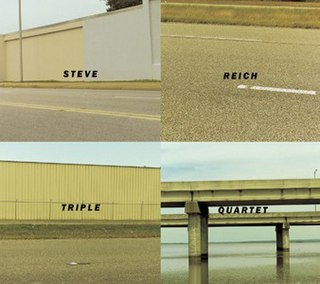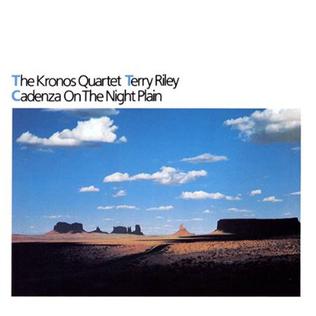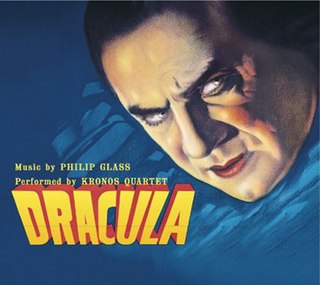
Terrence Mitchell "Terry" Riley is an American composer and performing musician best known as a pioneer of the minimalist school of composition. Influenced by jazz and Indian classical music, his work became notable for its innovative use of repetition, tape music techniques, improvisation, and delay systems. His best known works are the 1964 composition In C and the 1969 album A Rainbow in Curved Air, both considered landmarks of minimalism and important influences on experimental music, rock, and contemporary electronic music. Subsequent works such as Shri Camel (1980) explored just intonation.

La Monte Thornton Young is an American composer, musician, and performance artist recognized as one of the first American minimalist composers and a central figure in Fluxus and post-war avant-garde music. He is best known for his exploration of sustained tones, beginning with his 1958 composition Trio for Strings. His compositions have called into question the nature and definition of music, most prominently in the text scores of his Compositions 1960. While few of his recordings remain in print, his work has inspired prominent musicians across various genres, including avant-garde, rock, and ambient music.

The Kronos Quartet is an American string quartet based in San Francisco. It has been in existence with a rotating membership of musicians for 50 years. The quartet covers a very broad range of musical genres, including contemporary classical music. More than 1,000 works have been written for it.

Pandit Pran Nath was an Indian classical singer and master of the Kirana gharana singing style. Promoting traditional raga principles, Nath exerted an influence on notable American minimalist and jazz musicians, including La Monte Young, Terry Riley, and Don Cherry. He began performing in the United States in the 1970s, and established the Kirana Center for Indian Classical Music in 1972; he subsequently taught in various universities across the US and Europe.
Drone music, drone-based music, or simply drone, is a minimalist genre of music that emphasizes the use of sustained sounds, notes, or tone clusters called drones. It is typically characterized by lengthy compositions featuring relatively slight harmonic variations. La Monte Young, one of its 1960s originators, defined it in 2000 as "the sustained tone branch of minimalism." Music containing drones can be found in many regional traditions across Asia, Australia, and Europe, but the genre label is generally reserved for music originating with the Western classical tradition. Elements of drone music have been incorporated in diverse genres such as rock, ambient, and electronic music.
Steven "Steve" Mackey is an American composer, guitarist, and music educator.
Michael Harrison is an American contemporary classical music composer and pianist living in New York City. He was a Guggenheim Fellow for the academic year 2018–2019.
Starkland is an independent record label based in Boulder, Colorado that specializes in alternative classical music. It was founded in 1991 by Thomas Steenland.

The Fountain: Music from the Motion Picture is the soundtrack album to the 2006 film The Fountain directed by Darren Aronofsky. Released on November 27, 2006, through Nonesuch Records, the album is a collaboration between contemporary classical composer and frequent Aronofsky collaborator Clint Mansell, classical string quartet the Kronos Quartet, and post-rock band Mogwai. The score received mixed reviews from critics and was nominated for several awards.

The discography of the Kronos Quartet includes 43 studio albums, two compilations, five soundtracks, and 29 contributions to other artists' records. The Kronos Quartet plays classical, pop, rock, jazz, folk, world and contemporary classical music and was founded in 1973 by violinist David Harrington. Since 1978, they have been based in San Francisco, California. Since 1985, the quartet's music has been released on Nonesuch Records.

Terry Riley: Requiem for Adam is a studio album by the Kronos Quartet. The music was composed by Terry Riley, commissioned by the quartet; the album is a requiem for Adam Harrington, the son of Kronos co-founder David Harrington.

Steve Reich: Triple Quartet is a studio album by the Kronos Quartet and other artists. The music was composed by Steve Reich and was commissioned by the quartet; Reich and the quartet have worked together since 1989.

Terry Riley: Cadenza on the Night Plain is a studio album by the Kronos Quartet, the first album-length recording of a collaboration between the quartet and American composer Terry Riley.

Pieces of Africa is a 1992 studio album by the Kronos Quartet, containing works commissioned by the quartet, written by seven African composers.

Witold Lutosławski: String Quartet is a studio album by the Kronos Quartet, containing String Quartet by Polish Witold Lutosławski composed in 1964 and first performed in 1965. This string quartet is an example of aleatory music, that is, music in which some element of the composition is left to chance, and/or some primary element of a composed work's realization is left to the determination of its performer(s). As Gerald Gold noted in a review of the Kronos album in The New York Times, "the Lutoslawski composition integrates notated music with chance performance."

Piano and String Quartet is a composition by American avant-garde composer Morton Feldman. It was commissioned by the Kronos Quartet and pianist Aki Takahashi, who premiered the piece at the 7th annual New Music America Festival in Los Angeles and released a studio recording in 1993.

Bob Ostertag: All the Rage is an experimental album by the Kronos Quartet and Eric Gupton (reading). It is a composition by Bob Ostertag, whose loops and samples are alternated with music by the quartet. Ostertag composed the piece as a response to California governor Pete Wilson veto of pro-gay legislation in 1991. Proceeds went to AIDS research.

Early Music is a studio album by the Kronos Quartet, containing 21 compositions, many of which were written, arranged, or transcribed for the quartet. The subtitle is from Dowland's Lachrimae, or Seaven Teares of 1604.

Dracula is a soundtrack performed by the Kronos Quartet, with music composed by Philip Glass, for the 1931 film Dracula.
This is a Nonesuch Records discography, organized by catalog number.















